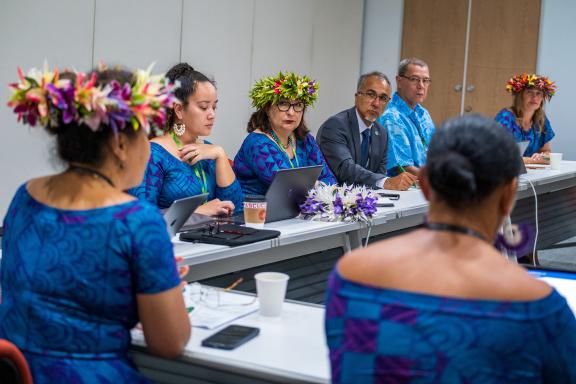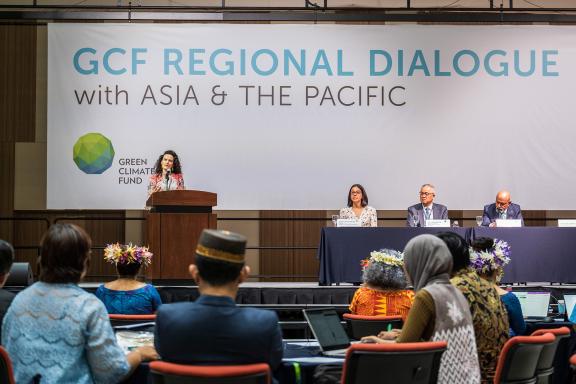GCF Regional Programming Dialogue with Asia and the Pacific: enhancing regional access to climate finance
Stakeholders and partners gathered in Incheon, Republic of Korea, for GCF’s Regional Dialogue with Asia and the Pacific. GCF Executive Director, Mafalda Duarte (centre), with representatives of organisations and governments from Asia and the Pacific.
With more than 120 participants gathered in Incheon, Republic of Korea, the Green Climate Fund’s (GCF) Regional Programming Dialogue with Asia and the Pacific kicked off from 7-11 August. The Dialogue brought together participants from 23 regional governments representing GCF’s National Designated Authorities (NDAs), 11 Direct Access Entities (DAEs) and several representatives of International Accredited Entities (IAE) along with GCF staff to discuss ways to accelerate access to climate finance in a region hit hard by the consequences of climate change.
The meeting provided an invaluable opportunity for GCF partners and stakeholders in the Asia Pacific region to create bonds and share knowledge on local and global climate efforts, while meeting face-to-face with the GCF Secretariat. With 34 formal bilateral meetings and more than a handful of GCF sessions, it provided ample opportunities to advance the climate finance and climate action agenda in the region.
To start the proceedings, GCF’s newly appointed Executive Director, Mafalda Duarte, was joined by His Excellency Ponlok Tin, Secretary of State of the Ministry of Environment, Kingdom of Cambodia, and Saud Minam, Chief Executive Officer of the Fiji Development Bank (FDB). The trio underlined the critical importance of immediate climate action and the removal of barriers that prevent climate finance from reaching those on the front lines of climate change in developing countries. Their remarks were followed by a briefing on GCF with updates on the Fund’s 97 projects in the region, ongoing second replenishment and GCF’s recently adopted strategic plan.
The participants engaged in a workshop on the development of proposals for GCF. Kemitraan Indonesia and the Development Bank of the Philippines (both GCF Accredited Entities) presented their concept notes to peers and GCF staff, who provided constructive feedback on the concept notes. A project marketplace was held to mix and match country priorities (NDAs) with potential partnership organisations (AEs) responsible for implementing projects. With an audience of both DAEs and IAEs, the Federated State of Micronesia (FSM) and Thailand presented their project ideas on health, wellbeing, and water, for which they are looking for partners to collaborate in efforts to reach their climate goals.
The second day focused on accreditation. GCF introduced the recently launched Project-specific Accreditation Approach (PSSA), which allows a partner to gain accreditation for the duration of a single climate project or programme, thereby limiting some of the capacity requirements for a longer accreditation period. As a show of togetherness, Pacific countries agreed on moving forward with the Pacific Regional Programming Initiative, establishing a project drafting committee and ensuring a unified approach to climate finance programming ahead of the Pacific Leaders meeting and COP28.

Participants from Asia and the Pacific wore attire from their home countries to bring some colour and vibrant energy into the sessions.
The third day started off with an introduction to GCF’s approach to greening the finance sector and its efforts to enhance the capabilities of NDAs. Like the first day, countries were given the chance to present their project ideas. Representatives from Cambodia presented ideas on eco-system-based adaptation, while Fiji, FSM, Solomon Islands and Vanuatu presented projects relating to early warning systems.
On the fourth and last day, many of the same Small Island Developing States (SIDS) joined the Maldives in the Climate Smart Resilient Island Initiative in a session sponsored by the German Agency for International Cooperation (GIZ). During a marketplace session that followed, Kiribati, Tuvalu, Naru, Fiji and FSM presented their project ideas to potential implementing partners. Before that, GCF held a session focusing on the role of Directs Access Entities (DAEs) going forward.
Two AEs, the Secretariat of the Pacific Regional Environment Programme (SPREP) and Conservation International (CI), shared their experiences in implementing funding proposals. In another session, NDAs had the chance to test some of the knowledge acquired over the course of the Dialogue, where they practiced developing a draft water project concept note and climate risk assessment. The mock draft proposal marked the successful ending of this year's GCF Regional Programming Dialogue with Asia and the Pacific, which was closed with words from the GCF Deputy Executive Director, Henry Gonzalez, along with observations from the civil society representative, Ms Danica Marie Supnet.
For more information and further updates, please visit the official GCF website or contact the GCF Regional Desk for Asia Pacific.
¹Asia Pacific countries invited to this Dialogue include: Cambodia, Cook Islands, Fiji, Federated States of Micronesia, Indonesia, Kiribati, Lao PDR, Malaysia, Maldives, Nauru, Niue, Palau, Philippines, Papua New Guinea, Republic of the Marshall Islands, Samoa, Singapore, Solomon Islands, Thailand, Timor-Leste, Tonga, Tuvalu, Vanuatu, Vietnam.

The Asia Pacific Dialogue participants were among the first partners to meet GCF’s new Executive Director Mafalda Duarte who had just joined the Fund.